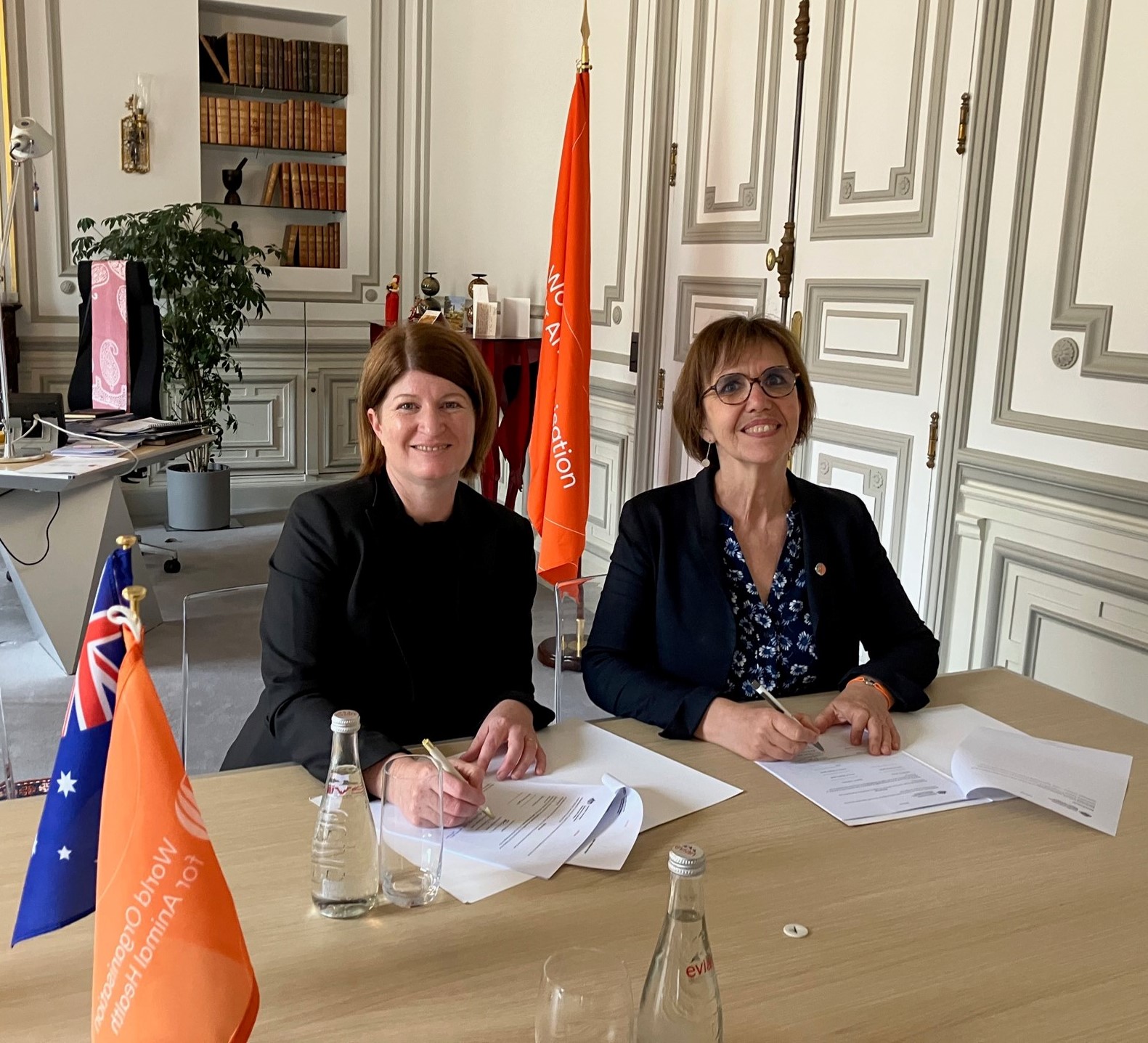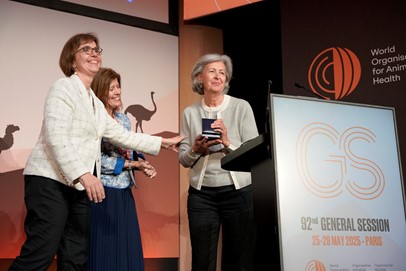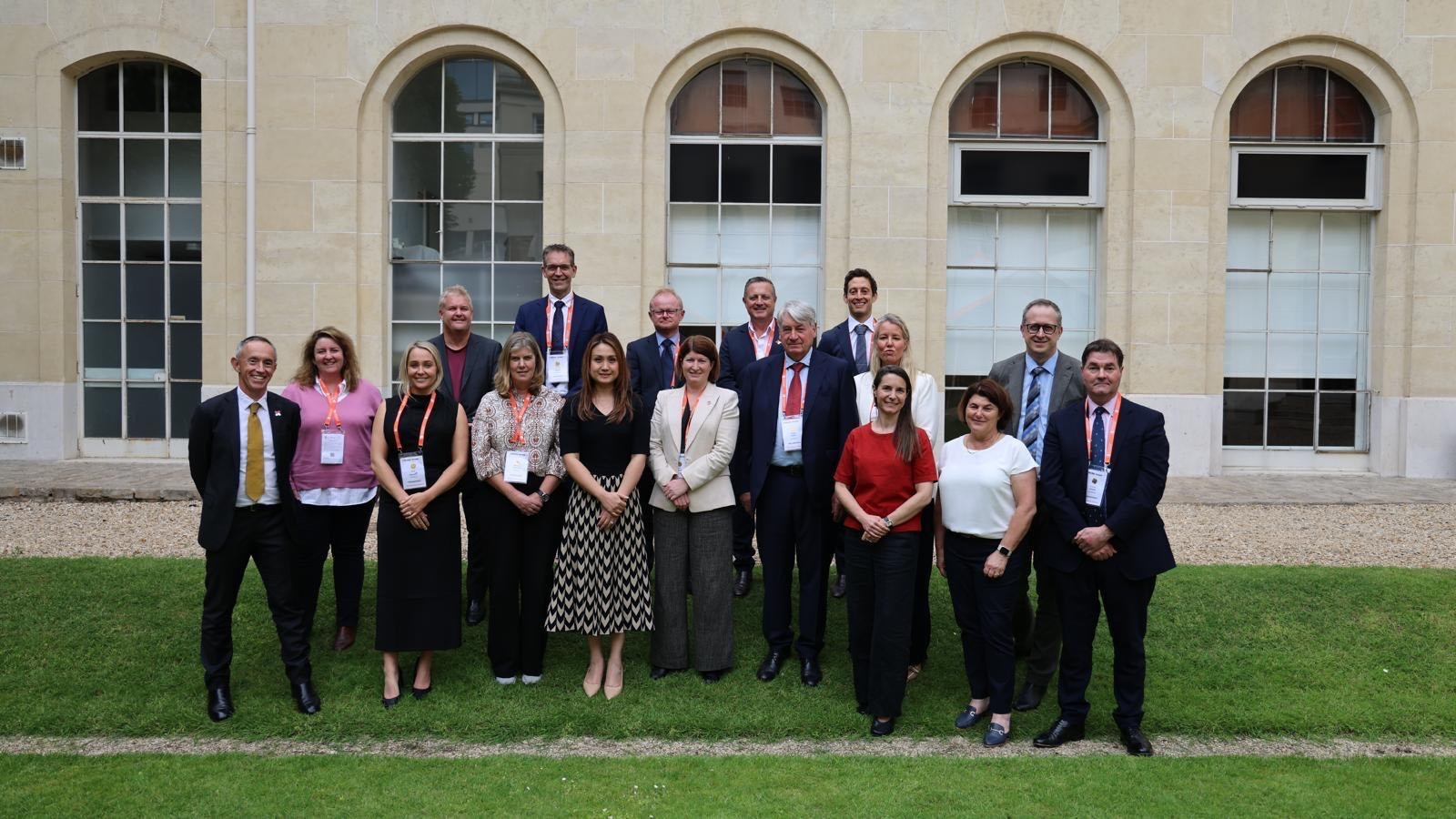From the desk of the Australian Chief Veterinary Officer: The WOAH 92nd General Session
19 Jun 2025Inside the historical halls of the Maison de la Chimie in Paris, Australia participated in the 92nd General Session of the World Assembly of Delegates. The purpose of this annual assembly of the 183 Member Countries of the World Organisation for Animal Health (WOAH) is not symbolic diplomacy – Australia’s mission in this forum is to help shape the global landscape for safe trade and biosecurity to benefit our animal health, farmers, and other stakeholders. Our work here extends beyond the General Session floor, into the offices of WOAH executives, meeting rooms with valued trading partners, and even in hallways with industry and other international organisation representatives.
As Australia’s Delegate to WOAH, I had the privilege of leading our 16-member delegation at this year’s assembly, from 25-29 May 2025. WOAH is the global authority on animal health, welfare and trade, whose expanding role was evident with over 1100 participants this year. WOAH Delegates representing their nations discuss and vote on resolutions about animal disease activities and the adoption of international standards on animal health, welfare, and trade.
Regional Representation and the Role of Asia and the Pacific
While resolutions and standards are widely adopted around the world, their implementation at the regional level has the biggest impact in preventing animal diseases for Australia and neighbouring countries – which are also valued trading partners. As the Secretary-General of the Regional Commission for Asia and the Pacific, I’m focused on ensuring Australia and our region’s unique challenges are front of mind for WOAH and that the organisation is well placed to assist the region to meaningfully improve the control of transboundary animal diseases.
In the margins of the General Session, I met with senior WOAH staff including Dr Hirofumi Kugita, Regional Representative for Asia and the Pacific, and Dr Naree Ketusing, Sub-Regional Representative of South-East Asia. We discussed priorities for the region and options to promote more sustainable funding for these efforts.
I was also pleased to sit down with the Director General of WOAH, Dr Emmanuelle Soubeyran, to formally extend further financial support to WOAH’s mission of improving animal health. We face ongoing threats from diseases like foot-and-mouth disease which could cost Australia an estimated $80 billion over 10 years if it reaches on our shores. This funding will support WOAH’s activities in South-East Asia to help control the spread of animal diseases and include a focus with Indonesia.

Signing the contract for Australia’s further support for WOAH in the Asia and Pacific Region with Dr Emmanuelle Soubeyran. Image credit: Emily Tagliaro.
The 32 Members of our Regional Commission met ahead of the General Session to share positions and prepare for the biennial Regional Conference in Jakarta, Indonesia in September this year. Members also focused on the work of WOAH’s Governance Review Committee, created to review WOAH’s governing texts and structures so it is well placed to represent its members as a modern and credible intergovernmental organisation. I am a representative on this group for Australia, but also our Pacific neighbours. It has been invaluable to have Dr Coralie Lussiez, the Chief Veterinary Officer of New Caledonia, support me as an advisor. Together, our region agreed to Australia’s proposed joint intervention to highlight the importance of this work, which was presented during the official proceedings of the General Session.
Achievements within the Asia-Pacific region, recognised at the General Session, included endorsement of our national laboratory the CSIRO Australian Centre for Disease Preparedness’s (ACDP’s) Twinning Project with the Indonesian Disease Investigation Centre Wates (DIC Wates). As a WOAH Reference Laboratory for avian influenza, ACDP will provide technical support, guidance, and training with the aim for DIC Wates to achieve the same designation. Australia also supported the designation of wildlife Collaborating Centres in Singapore and Thailand.
The General Session begins
In this article last year, I acknowledged the important contributions of former Director General, Dr Monique Eloit, upon finishing her 8-year tenure. Her vision enabled a more Member-led WOAH and with Australia’s funding, led to the establishment of the Governance Review Committee. It was great to see her achievements recognised by being awarded WOAH’s highest honour – the Gold Medal, announced during the opening session.

Dr Monique Eloit (right) receives the WOAH Gold Medal
This year’s Animal Health Forum topic ‘Veterinary vaccines and vaccination: from science to action – reflections for change’ allowed Delegates to explore the current barriers to the development and use of vaccines in disease prevention and control. It involved panel and roundtable discussions with Delegates, WOAH Council members, other experts, and representatives from various organisations. The importance of communication, using vaccination in conjunction with other strategies, working to minimise trade impacts associated with the deployment of appropriate vaccination strategies and Member involvement in standard development and implementation emerged as key themes of discussions.
Australia was invited to join a writing group to draft a resolution containing recommendations for WOAH and its members on this topic which was subsequently adopted. WOAH will work to address various challenges in animal vaccination strategies, including developing Target Product Profiles for vaccines against priority animal diseases and assessing the inclusion of aquatic animal vaccination protocols in the Aquatic Code and Manual.
International Standard Setting
As WOAH is recognised as the global authority on standards on animal health and safe trade, it is vital for Australia that these standards are science-based and favourable to Australia’s unique context. I am pleased with the outcomes of the 92nd General Session, where 73 new or revised standards were adopted. Of note were changes to how WOAH considers official recognition of contagious bovine pleuropneumonia and African horse sickness and the relationship with the principles of risk analysis and equivalence. A proposed chapter on bovine viral diarrhoea virus was not adopted due to objections from some members on the proposed case definition.
In tandem with other Members, Australia successfully advocated for the scientific basis of the final standards adopted. I also took the opportunity to highlight WOAH’s work and diligence in quickly developing the new Aquatic Code chapter on Megalocytivirus pagrus1 in collaboration with ACDP. This virus can infect iconic native species like the Murray cod and if introduced to Australia, could severely impact both aquaculture industry and environmental conservation efforts. Australia will contribute to developing the future Aquatic Manual chapter on this disease with ACDP’s help.
Bilateral meetings
The General Session is attended by WOAH Member Delegates, their senior animal health and trade officials, and even Agriculture Ministers. This presents a unique opportunity for delegations to meet, discuss and progress shared biosecurity, animal health and trade interests. Australia formally met bilaterally with 14 trading partners, addressed ‘opportunistic’ market access enquiries from delegations and engaged in several fruitful discussions with international animal industry and non-government organisations in the margins of the General Session.
Conclusion and next steps
It was a privilege to represent Australia at the 92nd General Session and engage with many fellow WOAH Delegates and representatives. A focus of my office over the coming months will be to maintain our strong engagement and credibility on standard-setting, represent Australia and the Asia and Pacific on the WOAH Governance Review Committee, contribute to consultation on WOAH’s 8th Strategic Plan, and support our WOAH activities in our region for transboundary animal disease control.
I am grateful for the Australian delegation who accompanied me and generously shared their expert knowledge to enhance Australia’s engagement with WOAH and its Members. Thank you to our stakeholders for their feedback and input into WOAH standards and contributions to our wider General Session preparations. As Australia’s Delegate, I am always proud to be the spokesperson for the incredible efforts and expertise of all those working behind the scenes to ensure Australia’s voice is represented well.
I look forward to the 93rd General Session and its new venue in May 2026 – with such strong global participation, we have truly outgrown the capacity of the Maison de la Chimie.
For the latest updates on the work of the Office of the Chief Veterinary Officer, please follow the social media channels of the Australian Chief Veterinary Officer on Twitter/X and LinkedIn.

The Australian Delegation to the WOAH 92nd General Session. Back row, from left to right: Steve Unwin (Program Manager, Wildlife Health Australia), Dwane O'Brien (Deputy Director, Australian Centre for Disease Preparedness), Mark Schipp (Director, Australian Veterinary Association), James Gilkerson (Vice President and Director, Australian Veterinary Association), Ashley Jordan (Director, Multilateral Engagement (OCVO), DAFF), Ben Stapley (Executive Director, Animal Medicines Australia). Front row, from left to right: Ben Madin (Managing Director, Ausvet), Jaimie Hunnam (Senior Consultant, Ausvet), Katie Hallatt (Industry Capability program Manager, Livecorp), Rochelle Prattley (Acting Assistant Secretary, Animal Biosecurity Branch, DAFF), Mary Wu (Chief Executive Officer, Chair of Animal Health Australia Industry Forum), Beth Cookson (Chief Veterinary Officer of Australia), James Judd (Director, Bioproperties), Amy Little (Agricultural Counsellor (London), DAFF), Tiggy Grillo (Chief Operating Officer, Wildlife Health Australia), Samantha Allan (Chief Executive Officer, Animal Health Australia), Graeme Cooke (Chief Veterinary Officer of Victoria). Image credit: WOAH.
